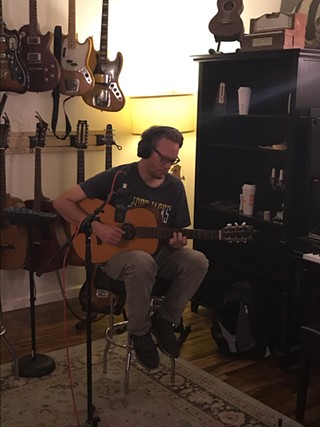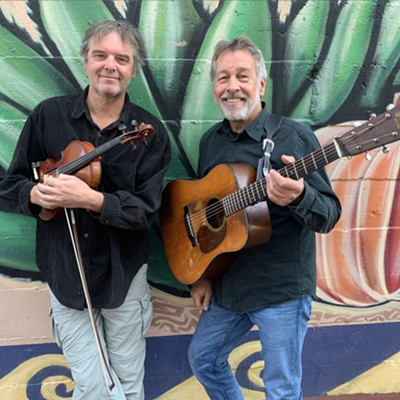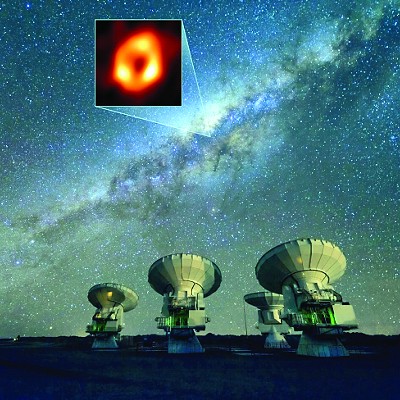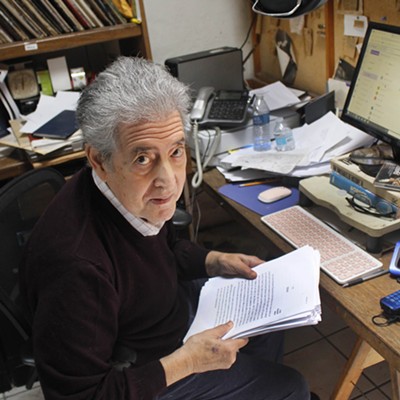On their debut album, Homecoming, the Keith Robinson Band aimed to create a record that was true to Southern Arizona—but avoided sounding "local." In many ways they succeeded. While never straying far from a folk/rock template, much of the album's singularity can be attributed to frontman Keith Robinson's lyrics jumping between genre conventions and more abstract themes—and hell, even a mellotron made its way in between the acoustic guitars and desert imagery.
The album opens with "Lost In Space," a rock song much in the borderlands vein, with fuzzy guitars and driving drums. However, it avoids sounding too familiar thanks to Robinson's philosophical background: studying Nietzsche and Heidegger at Fuller Seminary.
In the opener, Robinson sings about Judas and asks the Lord to show him the way, reflecting a kind of existential vertigo in the Sonoran sun. The following track, "Psalm 151," shifts styles in favor of a sparse acoustic intro, slowly progressing as instruments join in. It's a delicate and gorgeous setting for Robinson to sing over: "My malaise has gotten out of hand... It's a compromised promised land full of all these gospel songs."
"We tried to balance the record for listeners by setting up dynamics and varying the instrumentation for different types of songs," Robinson said. "At the same time we sprinkled some musical elements throughout the record to try to give it a unified feel rather than just a haphazard collection of songs; the picky stuff in 'Psalm 151' is echoed in the picking pattern in the final song, 'Homecoming,' for instance. And the fuzz guitar in 'Lost in Space' gets a reprise later in the album in 'Ocean Walker.'"
These varied sounds are helped with nearly every performer serving as a multi-instrumentalist: Robinson plays guitar, sings and performs some additional percussion; Evan Wagner plays bass and electric guitar plus percussion; Steven Tracy plays piano, organ and mellotron; and Dani Ponce sticks to the drumkit, though his energy serves multiple roles.
Released in the final days of 2020, the pandemic delayed and complicated Homecoming's recording sessions. This isolation and difficulty is present in multiple tracks, but Robinson wrote the majority of the songs before COVID was in our collective vocabulary. This is reflected in the album cover, balancing saguaros on one side and tombstones on the other, and in lyrics like "I saw an angel in the desert sun / A crystal hourglass empties fast / I used to walk on the forest floor / Present always becomes the past."
In March 2020, the band had a batch of songs ready to record, but everything was put on delay. While waiting, Robinson wrote two tracks inspired by the pandemic, which made their way into the recording sessions at St. Cecilia Studios in August, with Tracy as engineer.
"It would have been tone-deaf, we thought, to record an album during such global upheaval without alluding to the pandemic at all," Robinson said. "Everyone was wary of COVID, so the August sessions were limited to a tight little group—Steven, myself, bassist Evan Wagner, and drummer Dani Ponce. No girlfriends, friends, or outsiders allowed. We recorded the whole album in just three days—granted, three long days—with another day-and-a-half devoted to mixing and last-second adjustments."
Robinson credits these quick and successful sessions to the fact the band had extra rehearsal time due to COVID delays—though this time both helped and hindered.
"In April I was in a bad way. I had awful bouts of insomnia, I wasn't eating, I was cut off from almost all human interaction, I never knew what day of the week it was, and in my head it generally felt like the world was ending," Robinson said. "That experience bled into the songs. The record, in other words, is not making any grand, definitive pronouncements about whether life is worth living or whether God exists. Those questions are up for grabs. The lyrics are more simply just an expression of how I was feeling at the time. Death seemed imminent, all around me, so I wrote material reflecting what that felt like."
Though themes of loss permeate the album, the warm instrumentals and broader philosophical lines—such as when Robinson echoes Heraclitus' adage that you "can't step in the same river twice"—combine for an album that is true to Southern Arizona, and definitely true to the world beyond that.
"The record certainly contains some bleak moments," Robinson said. "But my hope is that the gloom contributes to the beauty rather than detracting from it."












